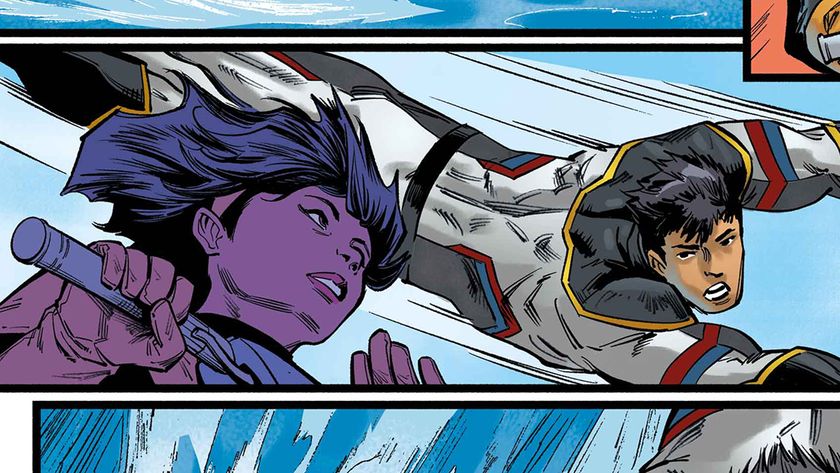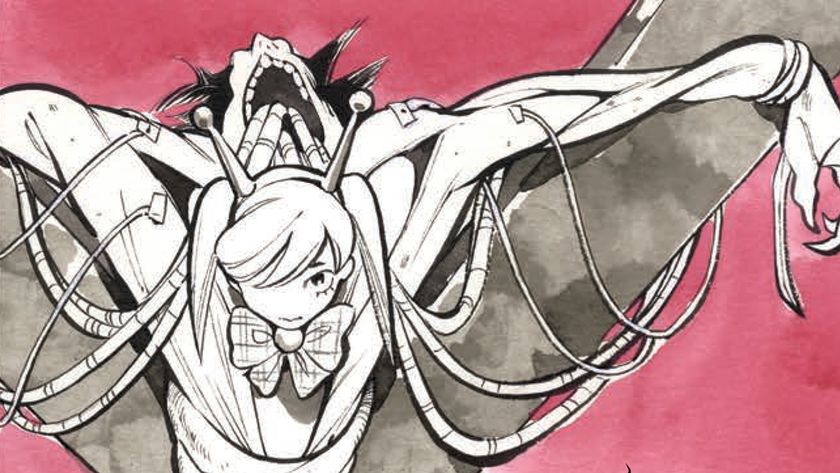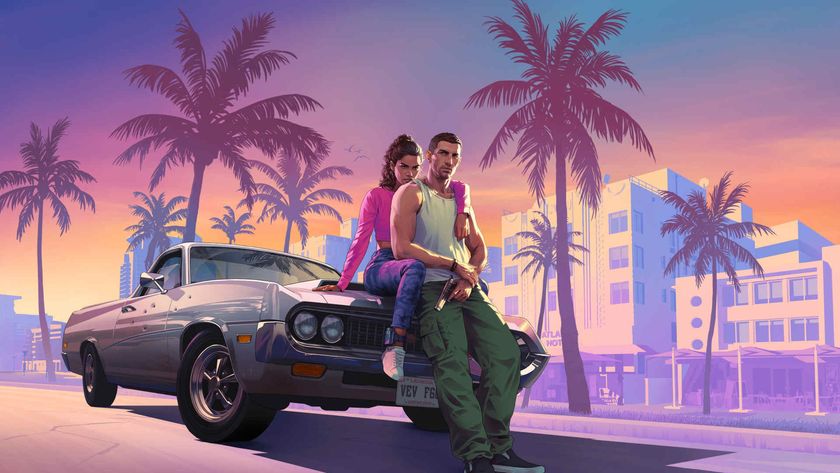Man of Steel: Actor Michael Dorn reveals the secrets of Steelworks, his comics-writing debut
The Star Trek actor explains why John Henry Irons is thinking of hanging up his hammer
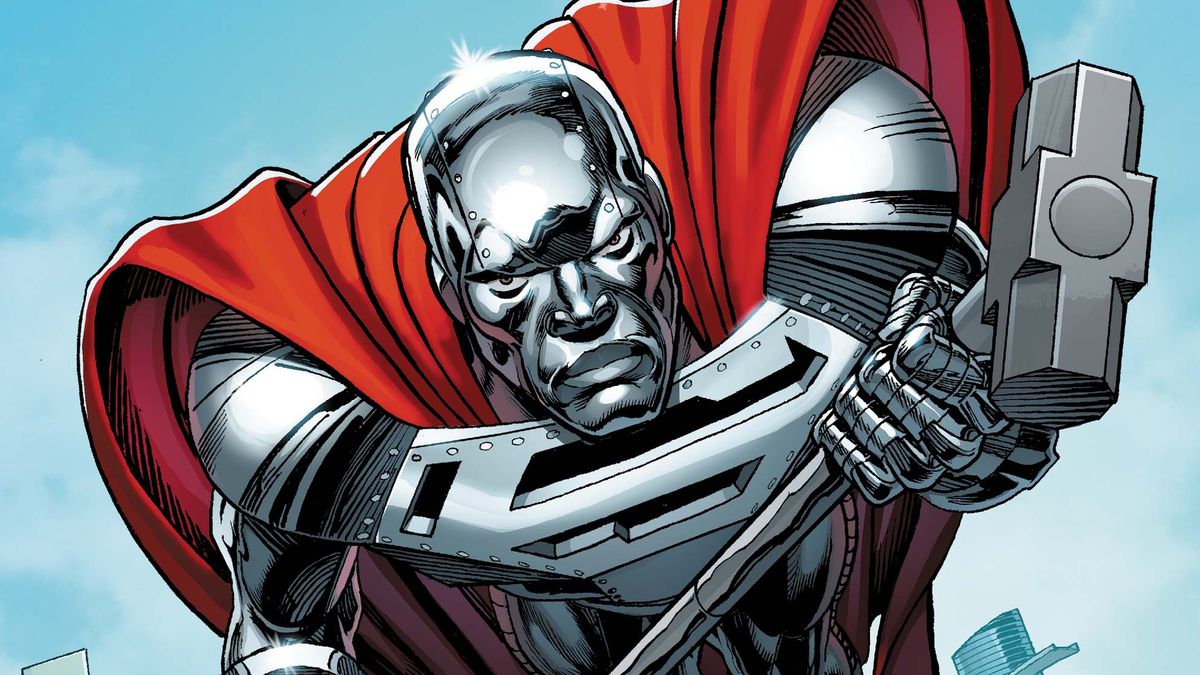
Michael Dorn should likely need no introduction to anyone reading this. As an actor he first brought to life the character of Worf on Star Trek: The Next Generation in 1989, investing the Klingon warrior with warmth, humor, strength and nobility. He recently returned to the role in the terrific third season of Star Trek: Picard, but the reason why Newsarama is talking to him today is due to a slightly unexpected career shift.
In an eye-catching move, DC Comics recently announced that Dorn would be writing Steelworks, the new six-issue miniseries coming out under the Dawn of DC banner devoted to John Henry Irons, AKA Steel, with the first issue set to debut on June 6.
Created by Louise Simonson and Jon Bogdanove, the character was first introduced to readers in 1993's The Adventures of Superman #500 and quickly made a lasting impression on both readers and his fellow superheroes. Dorn has history with the character, having voiced him in several episodes of Superman: The Animated Series. According to him, he's long had an interest in writing, so when DC approached him with the offer, he jumped at the chance - but we'll let him explain how it all went down...






Newsarama: Congratulations on the publication of your first comic book! How does that feel?
Michael Dorn: You know, it's a new feeling. And it's kind of a new world for me. When I was growing up, I loved comics, but that was about as far as it went. So, you know, I'm a virgin to this stuff, but I do like the challenge of it and the good thing is that everybody involved in the process is helpful and collaborative. I'm not just sitting there whimpering at the screen, because I don't know what to do! My thing was to just make sure that it's good and that I liked it, and that they [DC] liked it.
How did all of this come about? Did you reach out and say that you wanted to write for Steel based on your past relationship with the character?
It was actually sort of out of the blue. I had done a few episodes voicing John Henry [on the Superman animated series] but that was years ago. They called my manager and said, "We'd like to have Michael involved in this in whatever way he feels comfortable." I have a fledgling writing career and I thought that this was a great opportunity. So I asked if they would mind if I actually wrote it - and they were very open to that.
Comic deals, prizes and latest news
Get the best comic news, insights, opinions, analysis and more!
You mentioned that you grew up reading comic books. Do you recall what the young Michael Dorn would have been reading?
It was Superman. That was big. Green Lantern was also really big, and the Flash. Not so much Batman - we liked the idea that a guy could fly! But that was when we were, you know, eight, nine, ten, eleven. And then after a while, you know, I was really into sports and girls. [laughs]
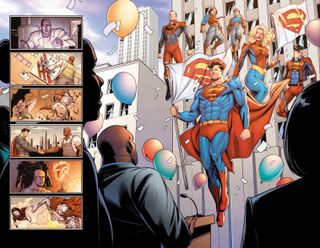
Steelworks #1 opens with John making plans for the future of Metropolis, and to change his own life quite fundamentally. What can you tell us about that?
His whole idea is that he's going to remake Metropolis. His idea is to do it for the people and not because of a vision that he has. He does have a vision, but it's less about him and more about the people and making them more responsible for their own future. He doesn't want the people, whenever they get into a jam, to look towards the heavens and say, "please, save us!" And so that was my take on it and the editors said, "That's very interesting. Yeah, we'll go with that."
But there's a deeper aspect of this, and that's [the question of] where does John Henry leave off and Steel begin? That's a dilemma that I also wanted to inject in there. It's not just a thought he has while he's having breakfast, it's something that is very deep for him. And there's a lot of things that have happened that we haven't seen yet, that we will see, that cause him to go in this direction.
John seems pretty optimistic about his plan in the first issue, but we know that there are a couple of villains out there plotting against him. What can you tell us about them?
One of the themes [of the book] is collateral damage. You know, somebody saved somebody and prevented a building from falling on somebody - but what are the wider ramifications of that? Because it can spread out into the community. If you save something there can be a price to pay.
There's two new villains. The main antagonist [Shawn Kerry] is somebody who is the product of collateral damage. We see him being saved and the ramifications of that echo all the way back to John Henry, and to Steelworks.
Kerry is judging everybody by his situation. He's had a major tragedy in his life. Lots of people have major tragedies in their life, and they don't turn into arch criminals, but he has. And of course there's various manipulations going on. And as we get into the series, the manipulations go deeper and deeper, until we get down to the core of what it's all about.
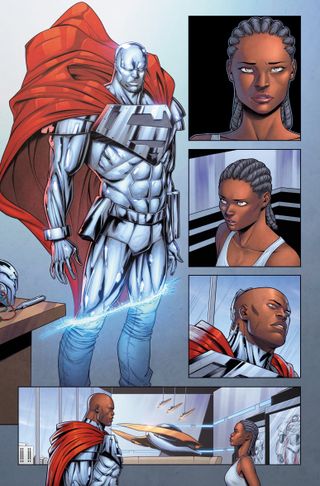
What is it about John Henry Irons as a character that you find interesting? What made you want to write him?
Well, the character was already fairly fleshed out. And there was no question about who he is and what he's doing, and his relationships. I always look for the interesting part, whether that's in writing or in acting roles and sometimes what's interesting is something that the writers or their producers haven't thought of. I thought the most interesting and the most treasonous thing you could do is have a superhero that goes, "I don't want to be a superhero anymore." He doesn't want to give it up entirely, but also he doesn't want to put on a suit every time there's a cat in a tree. And that's where the germ of the idea came from. It was, how can I make this guy more and more interesting?
Lana Lang is a big part of this book. How is the relationship between her and John these days? Does she have any qualms about his plans or are they still tight?
They are extremely tight. The relationship is solid. She's one of his biggest supporters and he appreciates that to the very nth degree. In fact, she's going to be one his champions in terms of saying, "Hey look, I think he's correct." It's the one thing that I wanted to keep as solid as possible. I think everybody around him is going to be kind of going, "I don't think this is a good idea, or, you know, are you sure about that?" But she is his champion and I wanted to keep them solid.
Natasha, his niece, is also on board, but she's a little wary. I think that there's an opportunity for Lana and Natasha to really get into it over John Henry and there are some things that may get really personal.
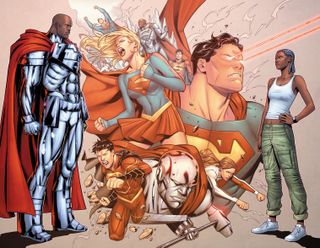
You're working with Sami Basri on this book. What did you think when you first saw his art for the series?
It's mind boggling. It really is mind boggling. I only saw [the issue] for the first time a couple of weeks ago and I was just like, "Yeah! Fantastic!" Even if I wanted to, I couldn't criticize it [laughs]. It's beautiful. And it definitely makes me want to rise to their level. I really want to make them [DC] happy that they've chosen me.
So have you got the comics bug now - will we be seeing more comics from you?
I think that's a question that we won't know until the very end. If they want to do something else, then great. I wouldn't be a virgin anymore, I would have this under my belt. So I think that it really depends on the response to this one. I would love to, but if nothing else happens, I'm very happy with the whole process and where I am right now.
As noted above, Steelworks #1 is published by DC Comics on June 6. But if you're looking for good DC comics before then, these are the best DC Comics stories of all time.

Will Salmon is the Comics Editor for GamesRadar/Newsarama. He has been writing about comics, film, TV, and music for more than 15 years, which is quite a long time if you stop and think about it. At Future he has previously launched scary movie magazine Horrorville, relaunched Comic Heroes, and has written for every issue of SFX magazine for over a decade. He sometimes feels very old, like Guy Pearce in Prometheus. His music writing has appeared in The Quietus, MOJO, Electronic Sound, Clash, and loads of other places and he runs the micro-label Modern Aviation, which puts out experimental music on cassette tape.
